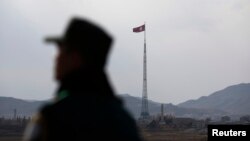The U.N. human rights office is calling for justice and accountability for victims of enforced disappearance and abductions by North Korea, which has engaged in the illegal practice since 1950.
A report issued by the U.N. office Tuesday describes the suffering of families across multiple generations who have had to bury their sorrow in silence, without compensation and acknowledgement by the Democratic People’s Republic of Korea (DPRK) government.
“The testimonies from this report demonstrate that entire generations of families have lived with the grief of not knowing the fate of spouses, parents, children, and siblings,” said Volker Türk, U.N. high commissioner for human rights.
“Enforced disappearance is a profound violation of many rights at once, and responsibility lies with the State,” he said.
A 2014 report by the U.N. Commission of Inquiry on the human rights situation in the DPRK found that the systematic and widespread nature of the abductions and enforced disappearances in that country “constituted crimes against humanity.”
The new U.N. report is based on interviews conducted in Seoul, South Korea with 38 male and 42 female victims of abduction and enforced disappearance, including relatives of forcibly disappeared people.
Survivors and witnesses spoke about the psychological and emotional impact these violations have had on their lives, and they described the trauma of having their lives ripped apart by these state-sponsored abductions and of not knowing the whereabouts and fate of their loved ones.
One witness, Kim Nam Joo, the son of Korean War abductee Kim Jung Ki, said “Only when I learn what kind of life my father led after his abduction will I feel any better. So that is my utmost priority.”
Another witness, Kim Jae Jo, whose father Kim Ki Jung was abducted during the Korean War, said he could not sleep thinking about what happened to his father.
“The confirmation of his fate is the most important,” he said. “I want his fate to be confirmed. If he has passed away, I’d like his remains to be returned.”
The 55-page report, entitled “These wounds do not heal,” details violations between 1950 and 2016. However, Marta Hurtado, the high commissioner’s spokeswoman noted that enforced disappearance is an ongoing crime.
“We fear that this practice continues currently with people inside the country—nationals that are arbitrarily detained and disappeared. They quite often are sent to prisons without their relatives being informed of their fate,” she said.
The report recounts enforced disappearance and abductions of foreign nationals both during and after the Korean War, which occurred between 1950 and 1953. It said nearly 100,000 South Korean nationals are estimated to have been abducted during the Korean War.
After the war, North Korea abducted 3,835 people from the Republic of Korea. Most eventually were returned, but the South Korean government reports 516 people were not.
Another category of abductees includes foreigners, mainly Japanese nationals, mostly descendants of Korean nationals.
Marta Hurtado said some of the Japanese were lured to North Korea “with the promise of a better life … and once they arrived voluntarily to North Korea, they were not allowed to go back,” she said. “They are considered as enforced disappeared.”
The Office of the High Commissioner for Human Rights reports that it continues to receive reliable information from former inmates about the ongoing existence of political prison camps. It says that “some of these escapees requested anonymity due to fear of retaliation against their families who remain in the Democratic People’s Republic of Korea.”
In the 2014 report on North Korea, Michael Kirby, chair of the U.N. commission of inquiry described the government’s sponsored abductions and disappearances of people from other nations as “unique in their intensity, scale, and nature.”
U.N. rights chief Türk said he was determined to engage with the North Korean government to resolve well-documented human rights issues.
“Now is the time for the Democratic People’s Republic of Korea to move away from isolation and work with the U.N. to find solutions to human rights issues—including the long-standing issue of enforced disappearance and abduction,” he said. “Victims have the right to truth and to justice, reparations and guarantees of non-recurrence.”




